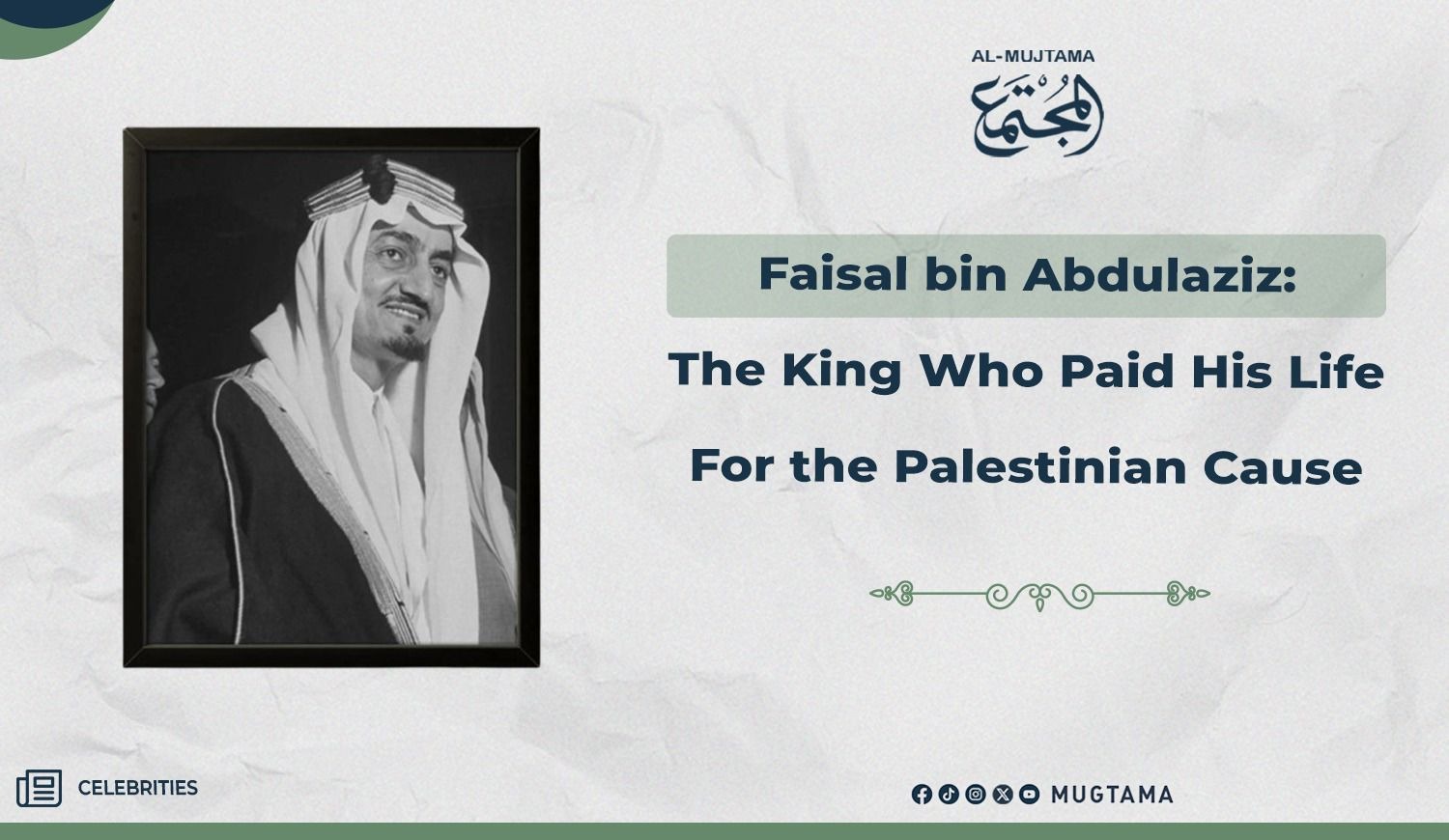Faisal bin Abdulaziz: The King Who Paid His Life for the Palestinian Cause

Since the occupation set foot on the first
handful of soil in the land of dignity and pride—Palestine—no sane mind or
person of conscience has ever ceased to support the Palestinian cause and
oppose the Zionist entity with hatred and condemnation. This stance was shared
by nations, peoples, and leaders alike—among them was King Faisal bin
Abdulaziz, the hero whose name remains etched in history as one of the greatest
leaders who never compromised the dignity of the Ummah and never hesitated for
a moment in defending Palestine, even if the price was his own life. That is
why Sheikh Ahmed Yassin once said: King Faisal paid with his life for
supporting the Palestinian cause.
So who was King Faisal bin Abdulaziz? How did he support Palestine? And did he
really pay with his life for that support?
King Faisal bin Abdulaziz Al
Saud
King Faisal was born in Riyadh in 1324 AH /
1906 CE. He was the third son of the founder of the Kingdom of Saudi Arabia,
King Abdulaziz bin Abdulrahman Al Saud. He was raised in the house of his
grandfather, Sheikh Abdullah bin Abdul Latif, who grounded him in Islamic
knowledge. By the age of nine, he had completed the memorization of the
Qur’an—as if to say that any foundation not rooted in religion and the Qur’an
is like a building on the edge of a crumbling cliff.
Built on the piety and pleasure of Allah,
King Faisal’s upbringing included learning horsemanship and politics from his
father. Thus, noble character, bravery, wisdom, and diplomacy were instilled in
him from an early age.
Despite his young age, his qualities
encouraged his father to appoint him as his representative in international
forums. From that point on, King Faisal continued to serve his country and
people, and championed the causes of his Ummah. Battlefields testified to his
insight and clarity, while political halls were stunned by his cunning and bold
determination.
King Faisal... True to the
Cause Since Youth
To King Faisal, the Palestinian cause was
not a mere political tool, nor was it a hollow slogan meant to win Arab hearts
or score rhetorical points—as some do with their weekly statement beginning
with “We strongly condemn…”. For him, it was a deep-rooted conviction that
matured with his awareness and grew with his sense of responsibility. From the
time he served as his father’s deputy in the Hijaz, he showed unwavering
opposition to the Zionist project. This was evident in many international
forums, where he persistently defended the rights of the Palestinians and
exposed the occupation to the world.
Should the World Map Be
Redrawn for the Jews?
In 1967, the Zionists managed to win over
French President Charles de Gaulle, who sympathized with them and supplied them
with weapons. They soon requested a meeting between him and King Faisal to
discuss the Palestinian issue. The meeting took place in the Élysée Palace in
Paris.
President de Gaulle said: “People speak of
your desire to throw Israel into the sea. Don’t you realize that Israel has now
become a reality no one in the world can change?”
King Faisal replied: “Your Excellency, I’m
surprised by your words. Didn’t Hitler occupy Paris and make it a reality? All
of France surrendered—except for you. You didn’t accept that reality, and
neither did your people. You resisted until you prevailed. So I’m surprised
that you now ask me to accept such a reality!”
De Gaulle responded: “Don’t forget that
Palestine is their original homeland, and their forefather Israel was born
there.”
King Faisal answered: “Should we redraw the
map of the world for the benefit of the Jews, but not for the benefit of Rome,
which once occupied France, the Mediterranean, and even England? Mr. President,
you currently have 150 countries with ambassadors in Paris. Many of these
ambassadors have children born here. If these children return to their
homelands and later demand Paris based on birthplace rights, what will you do?
Poor Paris—I don’t know to whom it would belong!”
King Faisal… and the Oil
Embargo Against the Zionists
From a young age, King Faisal supported the
Palestinian people and stood against the Zionist occupation. His stance reached
its peak during the 1973 war when he wielded the most powerful weapon the Arabs
had: oil. He ordered an embargo on oil exports to the United States, the
Netherlands, and other countries supporting the Zionist enemy in its war
against Egypt. He said: “This is for the sake of our religion and our
beliefs, and in defense of our holy sites and sanctities.”
This bold decision aimed to pressure the
Zionists into withdrawing from the occupied territories. It led to increased
global tension and public discontent in the West due to soaring oil prices. But
King Faisal’s message to the world—before and after the embargo—was clear: Arab
blood is not cheap, and the land of Palestine will not remain a playground for
the Zionists without cost.
Why Was King Faisal Killed?
Sheikh Ahmed Yassin Answers
When Sheikh Ahmed Yassin, founder of Hamas,
was asked about the assassination of King Faisal, he said: “The truth is,
King Faisal was killed because of his stance on Palestine and Jerusalem. He
said: ‘I want to pray in Jerusalem.’ He also supported President Gamal Abdel
Nasser with all his power and resources. When Jerusalem fell, he wept bitterly.
At the time, he was visiting Europe and said his famous words: ‘I am a king of
an Arab Islamic state, and Jerusalem has fallen while I am in Europe, and I
have done nothing!’”
King Faisal paid the price for that stance
with his life. He was assassinated by his nephew, Prince Faisal bin Musaad, on
March 25, 1975. The assassin shot him three times in the presence of the royal
guards inside the royal court. This led many to believe that foreign hands were
behind the assassination, given King Faisal’s antagonistic positions toward
“Israel” and his hostility to the United States through the oil embargo.
Removing King Faisal had long been a goal in Zionist and American circles since
the October 1973 war.
Yes, King Faisal was assassinated. But the
pledge was not, and the cause was not.
Al-Quds will remain alive in the heart of the Islamic Ummah.
There are men who carry its defense on their shoulders—with their pens, with
their voices, and with their very lives.
Let the enemy know: the soldiers of this Ummah will never be extinguished. If a
hundred are martyred today, a thousand will rise tomorrow—until the promise of
Allah comes to pass, and the land returns to its rightful owners, and the
banners of victory are raised above the minarets of Al-Aqsa, for “Allah will perfect His light, although the disbelievers
dislike it” — Surah As-Saff :8.
-------------------------------------------------------------
1. https://n9.cl/mplkb.
2.
https://n9.cl/2b9ro.
3.
https://n9.cl/s5bu7.
4.
https://n9.cl/kr7av.










